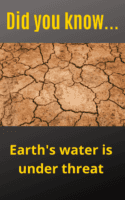Clean water is one of the earth’s most precious resources, but it is currently facing a crisis. Reliable clean water supplies are essential for agriculture, industry and energy production. Life on earth depends on water for daily survival but with our water supplies under threat, earth’s inhabitants are in a precarious position.
A number of regions globally are dreadfully short of water. According to The World Wildlife Fund (WWF), more than 1 billion people around the world do not have access to clean water. About 2.7 billion people experience water scarcity for at least one month of the year. Factors such as pollution, overuse of water, growing freshwater demand and climate change all contribute to the world’s water crisis.
Causes and effects of the water crisis
Water pollution threatens the availability of clean water as it makes water unfit for consumption. In 2019, there were reports from various media outlets that the Vaal River, which is the major water source in South Africa, was becoming polluted.
Wetlands all over the world are disappearing at an alarming pace. Wetlands are very important as they provide almost all of the earth’s access to freshwater. They are also used for hydropower and medicines.
Rising temperatures have negatively affected South Africa’s water supply. There has been a significant reduction in rain. According to The Water Project, dam levels in Durban are 20% lower now than they were at the start of 2010. This has a negative effect on agriculture, which uses about 70% of the world’s accessible fresh water. Farmers, especially commercial farmers, face financial ruin because of persisting drought. Livestock are dying because the grazing fields are covered in dead grass and herbage.
Over the last 50 years, the world’s population has doubled. The growing global population has increased the demand for fresh water. The use of water to cook and meet other needs has tripled due to this speedy growth. This has a major effect on people, as there is not enough fresh water for everyone.
People who use clean water irresponsibly are worsening the water crisis. The inappropriate use of water resources is wasting clean water and considering that we are using more water than before this causes a strain on the available resources worldwide. Clean drinking water is scarce and there are millions of people who do not have access to it. People who have access to safe drinking water, however, take it for granted.
The water crisis in the future
According to a report compiled by researchers at Aarhus University in 2014, there will not be enough water available to meet the world’s demand for drinking and energy consumption by 2040.
Decreasing water resources will make it difficult for food production to keep up with the growing world’s population. Water shortages will result in a decrease in food supply and eventually starvation because crops and livestock need water to survive.
It is nearly impossible to have a prospering economy when fresh water is not accessible for commercial and individual use. People will become very sick which will ultimately affect worker productivity. The cost of living will be higher as the cost of the water supply will be expensive to meet the demands of the population.
Fresh water resources are usually shared by two or more countries. There could be conflicts resulting in warfare both internationally and locally because water accessibility has become a powerful global issue.
Water crisis prevention
Education is crucial to solve the water crisis. People around the world need to be educated and made aware of the importance of using water resources responsibly.
Rainwater harvesting and wastewater recycling will not only help to prevent the water crisis but will also save money.
Proper sanitation must be practiced to prevent water pollution, which is also a cause of the water crisis.
Sewage systems must be improved because water becomes toxic and unsafe to drink when sewage flows into fresh water sources.
In a nutshell, everyone needs to play a part in conserving the earth’s fresh water because our lives, and the next generation’s existence, depends on it. Climate change should not take all the blame.
Tell us: What can you do in your community to help prevent the water crisis?

